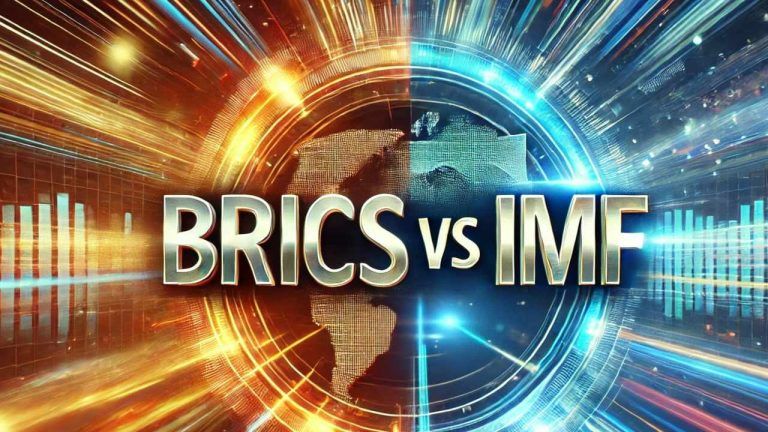
The first country to use Bitcoin (BTC) as a legal tender has reportedly passed a new law that will scale back its crypto efforts. Reuters reports that on Wednesday, lawmakers in El Salvador approved a bill to amend the nation’s Bitcoin law in compliance with a deal that the government struck with the International Monetary […]
The post El Salvador Passes New Bitcoin (BTC) Legislation Tied to New IMF $1,400,000,000 Funding Deal: Report appeared first on The Daily Hodl.

If the crypto market were a country, it would be the eighth largest in GDP terms behind the United States, China, Germany, Japan, India, the United Kingdom and France.
Crypto market capitalization has reached a new all-time high of $3.12 trillion — and is now close to surpassing France’s gross domestic product (GDP).
On Nov. 11, total crypto market capitalization soared 7% over 24 hours, due mainly to a sudden surge in Bitcoin, which rallied to $89,500.
If the crypto market were a country, it would be the eighth largest in GDP terms behind the United States, China, Germany, Japan, India, the United Kingdom and France.

The US government has added nearly $2 trillion to the national debt since the start of the year, according to new data from the Treasury Department. The Treasury’s Debt to the Penny database shows that the US national debt has increased by $1.92 trillion since January 2nd, bringing the total debt to more than $35.91 […]
The post $1,920,000,000,000 Debt Explosion Hits US As International Monetary Fund Issues Dire Warning on Nation’s ‘Loose Fiscal Policy’ appeared first on The Daily Hodl.

The International Monetary Fund (IMF) is sounding the alarm on skyrocketing levels of debt held by governments around the world. In its newest Fiscal Monitor Report, the IMF says global debt is expected to surpass $100 trillion by the end of the year. That’s up from $97 trillion a year ago, with the United States […]
The post Global Debt Will Shatter $100,000,000,000,000 This Year As Governments Prepare To Increase Spending, Warns IMF appeared first on The Daily Hodl.
 A Zimbabwean professor has highlighted the BRICS New Development Bank (NDB) as a crucial alternative to the International Monetary Fund (IMF), offering better financial terms to developing nations. He emphasized the NDB’s role in helping countries like Zimbabwe escape debt cycles and discussed the introduction of Zimbabwe Gold (ZiG), a currency backed by mineral wealth, […]
A Zimbabwean professor has highlighted the BRICS New Development Bank (NDB) as a crucial alternative to the International Monetary Fund (IMF), offering better financial terms to developing nations. He emphasized the NDB’s role in helping countries like Zimbabwe escape debt cycles and discussed the introduction of Zimbabwe Gold (ZiG), a currency backed by mineral wealth, […]
The International Monetary Fund (IMF) is reportedly recommending the Pakistan Federal Board of Revenue (FBR) expand the scope of their gains taxes to include crypto. According to a report from the Pakistani news outlet The News, the IMF is asking the FBR to bring crypto gains into the country’s tax net. The IMF is asking Pakistan’s […]
The post IMF Demands $3,000,000,000 Bailout Debt From Pakistan Through New Crypto Taxes: Report appeared first on The Daily Hodl.

The new all-time highs come despite Bitcoin still being down over 50% against its price peak of $69,000 against the U.S. dollar.
The price of Bitcoin (BTC) has notched new all-time highs against some of the world’s most inflationary fiat currencies.
Across 30 hours over Oct. 23 to 24, the cost of buying one Bitcoin has reached all time-highs when using the Argentine peso (ARS), Nigerian naira (NGN), Turkish lira (TRY), Laotian kip (LAK) and the Egyptian pound (EGT).
#Bitcoin just hit an all-time high in Argentina, Turkey and Nigeria. pic.twitter.com/sKRNUaBMX8
— Miles Deutscher (@milesdeutscher) October 26, 2023
However, it should be noted that the result is due to the ongoing devaluation of the currencies, exacerbated by Bitcoin’s recent 16% price increase.
NGN and TRY fell to their lowest points against the U.S. dollar on Oct. 24 and Oct.25, while ARS is only 0.85% off its all-time low (against the U.S. dollar).
According to the International Monetary Fund, the Venezuelan bolivar currently has the highest annual inflation rate at 360%, followed by Zimbabwean dollar (314%), Sudanese pound (256%) and ARS (122%).
The Turkish lira and Nigerian naira came in sixth and 15th with annual inflation rates of 51% and 25% respectively, IMF’s data shows.

Crypto observers have long seen digital assets, such as Bitcoin and stablecoins, as a hedge against rocketing inflation, the recent figures could bolster that narrative.
Nigeria, Turkey and Argentina boast the 2nd, 12th and 15th highest rates of cryptocurrency adoption in the world, according to a Sept. 12 report by Chainalysis.
With inflation at 99% in #Argentina, it’s 99% likely that the citizens of that beautiful country would benefit from #Bitcoin.
— Michael Saylor⚡️ (@saylor) February 15, 2023
However, the governments of these countries haven't always seen eye-to-eye with the cryptocurrency industry.
Nigeria is finally becoming more welcoming to cryptocurrencies after its central bank banned local banks from providing services to cryptocurrency exchanges in Feb. 2021.
Progress was made in December 2022 when Nigeria announced its intention to pass a bill recognizing cryptocurrencies as “capital for investment” — citing the need to keep up with “global practices” as one of the main reasons behind its change in stance.
And while Turkey is home to some of the most crypto-curious people, its central bank banned cryptocurrency payments for goods and services in April 2021. It has also working on a central bank digital currency (CBDC) to digitalize the Turkish lira over the last few years.
#Bitcoin fixes this
— Gülben Gözü (@gulbengozu) August 28, 2023
I'm back in my beautiful country, Turkey, after 6 months. Shocked to witness the same goods costing 3–4 times more already. Rents, food, public transport, and more costs skyrocket regularly. High inflation's devastation is real and alarming. pic.twitter.com/X4N4Axuh1n
Meanwhile, Argentina’s inflation crisis could be influenced by the outcome of its presidential election in November, with presidential candidate Javier Milei set to face competitor Sergi Massa in a final run-off vote on Nov. 19.
Related: Turkey to use blockchain-based digital identity for online public services
Massa, who currently serves as the country’s minister of economy, wants Argentina to launch a central bank digital currency (CBDC) “as soon as possible” as a means to “solve” the country’s long-lasting inflation crisis.
Argentina's present provides a glimpse into America's future, where the central bank raised interest rates 15 percentage points to 133% on Oct. 12. But with #inflation running at 138% and budget deficits and debt rising, the rate hikes will have no effect on reducing inflation.
— Peter Schiff (@PeterSchiff) October 26, 2023
He has also voiced an intention to keep the U.S. dollar away from Argentinians, explaining that Argentinians should instead be “patriots” and defend the Argentine Peso.
Milei on the other hand, wants the U.S dollar to be adopted in addition to abolishing Argentina’s central bank.
Magazine: Unstablecoins: Depegging, bank runs and other risks loom

The International Monetary Fund (IMF) says that sovereign fiat currency should always be valued and protected over crypto assets. In a new IMF blog post, the global bank encourages countries to maintain the integrity of their financial systems in order to prevent them being replaced by crypto assets. “The defense against the substitution of sovereign […]
The post IMF Urges Fiat Currency Be Protected From Crypto, Says Digital Assets Should Never Be Accepted As Legal Tender appeared first on The Daily Hodl.

Explore the IMF’s objectives, governance structure and key functions in promoting global financial stability.
Maintaining stability in the international financial system is essential for sustaining economic growth in a connected global economy. In this context, the International Monetary Fund (IMF) is essential for fostering international monetary cooperation, maintaining exchange rate stability and managing financial crises. This article provides an overview of the IMF and its objectives, governance structure and key functions.
The International Monetary Fund is a global institution with its main office in Washington, D.C. Its 190 member countries represent nearly the entire world. The main objective of the IMF is to promote economic growth and stability around the world by offering its member nations technical assistance, financial support and policy recommendations.
The IMF’s three main goals are as follows:
The IMF’s governance system guarantees that all of its member nations are represented and have equal access to decision-making. The essential components of the IMF consist of:
The IMF does a variety of tasks to achieve its goals, including:
Related: IMF optimism in Central African Republic, despite Bitcoin adoption
The IMF recognizes the potential benefits and risks associated with digital currencies. In its reports and statements, the IMF has highlighted several key considerations regarding digital currencies:
The IMF recognizes that digital currencies, in particular, central bank digital currencies (CBDCs), have the potential to improve financial inclusion by giving unbanked populations safe and convenient access to financial services.
A new IMF post warning against "crypto asset adoption" claims that CBDCs "can improve financial inclusion and lower remittances' costs." Does that ring a bell, anyone?
— JAN3 (@JAN3com) June 22, 2023
Avoid the CBDC trap, choose #Bitcoin instead! pic.twitter.com/emmTRGO4u7
Digital currencies have the potential to bring about technological advancements that could increase the speed and efficiency of financial transactions, cross-border payments and remittances.
The IMF has also emphasized the risks and difficulties related to using digital currency. Consumer protection, financial integrity, Anti-Money Laundering measures, cybersecurity and financial stability are a few of these issues. In order to reduce these risks, the IMF underlines the need for effective regulation and oversight.
The IMF is aware of the cross-border effects of digital currencies, including possible difficulties with regard to monetary policy, exchange rates, capital flows and international cooperation. It emphasizes the value of global coordination and cooperation in resolving these difficulties.
The IMF is intensively researching CBDCs and their possible effects on the world financial system. It highlights the importance of carefully planning and implementing CBDCs to ensure their consistency with goals for monetary and financial stability.
Related: IMF to publish CBDC handbook in response to increasing demand for guidance

Economists with the International Monetary Fund (IMF) are calling for more proactive measures to manage the risks of crypto as several nations crack down on the industry. In a new report, IMF’s Western Hemisphere Department division chief Mauricio Villafuerte and economists Rina Bhattacharya and Dmitry Vasilyev warn that outrightly banning crypto may have adverse consequences. “While […]
The post IMF Economists Say Complete Crypto Bans ‘May Not Be Effective’ Long-Term Policy Choices appeared first on The Daily Hodl.